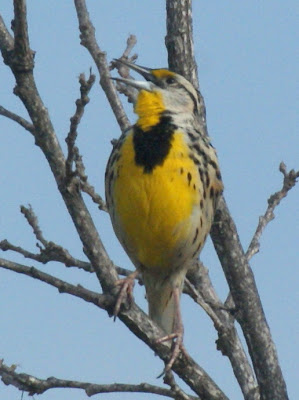.
This month I'm leading an intensive teacher-training course and so I'm not getting many opportunities to bird the campus. This is a pity because there seems to be a greater variety of bird species at the college than has usually been the case this winter.
The retention ponds continue to attact lots of Great and Snowy Egrets, as well as American Coots and Double-crested Cormorants. They still have scores of Ring-necked Ducks also.
Every visit I have made to the nature trail has turned up several Yellow-rumped Warblers and usually either an Orange-crowned Warbler or a Ruby-crowned Kinglet. A few Blue-gray Gnatcatchers have also been making a appearance.
Although American Robins have been surprisingly absent - I've seen just one all week - we have finally had good numbers of Cedar Waxwings. One day I saw a flock of 300+ while yesterday there was a group of 60.
I sprinkled some seed near the parking at the entrance to the nature trail and it didn't take long before one of our flocks of Savannah Sparrows discovered it. I've been able to sit in my car and watch up to 30 Savannahs foraging within a few feet of me, which has made it easy to get close-up photos of them.
I've been hoping that the seed would attract other sparrows too, but the only sparrow that has turned up with the Savannahs has been a solitary Field Sparrow.
The southwestern corner of the campus has been busy with Red-winged Blackboards. Up to 40 at a time perch on the trees or the utility wires and the males fill the air with their trilling. Not to be outdone, a few Eastern Meadowlarks have been singing their beautiful songs nearby, their yellow breasts gleaming in the sunlight.
It isn't all sweetness and light with our campus birds, of course. A Northern Harrier frequently flies over looking for prey, and a Red-shouldered Hawk is normally lurking somewhere in one of the trees. Our resident Red-tailed Hawks are very active hunters.
Yesterday I saw the female Red-tailed carry a dead bird - perhaps a White-winged Dove - to the top of a utility pylon, where she proceeded to pluck and then eat it.
Also yesterday, I saw my first Purple Martin of the year. I imagine it won't be very long before a dozen or more pairs return to breed on the campus.
.










No comments:
Post a Comment